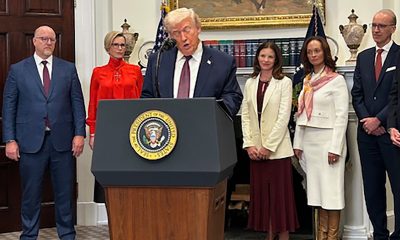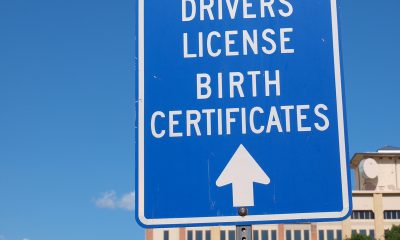Local
Polyak discusses marriage referendum, future activism
Former Equality Maryland board chair spoke to the Blade less than a month after she stepped down
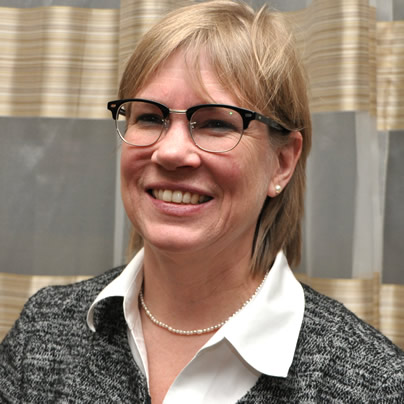
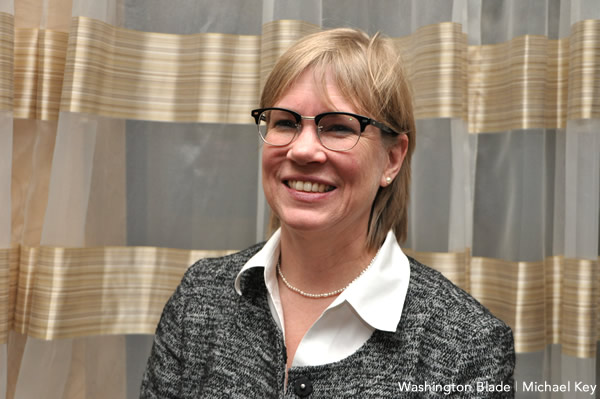
Polyak was lead plaintiff in the Maryland marriage equality lawsuit (Deane and Polyak v. Conaway). (Washington Blade photo by Michael Key)
The former chair of Equality Maryland’s Board of Directors stressed on Monday she remains optimistic that voters will uphold the state’s same-sex marriage law in November.
“The polling trend is definitely way more positive than it has been in the last couple of years, but we continue to see evidence of people feeling strongly in another way,” said Lisa Polyak, referring to the controversy over Chick-fil-A President Dan Cathy’s comments against marriage rights for gays and lesbians. She also described Josh Levin of Marylanders for Marriage Equality as a “very effective campaign manager” who has begun to receive the resources she said he needs to defend the same-sex marriage law at the ballot. Polyak added she feels that both President Obama’s support of nuptials for gays and lesbians and the National Association for the Advancement of Colored People’s resolution in support of the issue provided the campaign with additional momentum.
“If we win in November, it will be in large measure because of those two events,” she said. “The campaign, rightly, is coming in under that and doing their job efficiently and well.”
Polyak and her partner of more than 30 years, Gita Deane, have remained two of the most prominent figures in the fight for nuptials for gays and lesbians in Maryland since they became the lead plaintiffs in the same-sex marriage lawsuit that Equality Maryland and the American Civil Liberties Union filed in 2004. The Maryland Court of Appeals in 2007 ultimately upheld the constitutionality of the state’s ban on nuptials for gays and lesbians, but Polyak stressed to the Blade that she and Deane simply wanted to protect their children.
“The reason we got involved in the first place was because we’ve had all of these sorts of unexpected experiences trying to take care of our kids,” she said, pointing to obtaining health care and passports for the couple’s two daughters and entering the country with them were among the difficulties they faced. “Starry eyed, we thought well we’ll get involved with the marriage litigation because you know if we were married we wouldn’t have these problems, although of course we had no idea what was ahead.”
Polyak said that the children of she and her wife Deane, Maya, who is 16, and Devi, who is 13, “were fairly renascent” about their decision to challenge Maryland’s same-sex marriage ban.
“For the older one, we told her that we were going to be in the litigation and we told her why in terms that we thought were appropriate for her… [what] it boiled down to is that we wanted to be married and that we couldn’t be married right now because of the way that the law was and just that she was shocked. And she told us so,” she recalled. “She goes; what do you mean you’re not married? I thought you were my parents and why aren’t you married? So it began sort of not just being the public face, but also like having this conversation in an ongoing way with our kids every year of their growth about what they could understand.”
Court of Appeals decision was “awful”
“Ultimately, for me especially it was important for them to see that even when things don’t go the way you want the first time, you don’t give up,” said Polyak as she stressed the need for her and Deane to “hold ourselves together for our girls so that they didn’t think bad things were going to happen to them or to our family.”
More than four years after Maryland’s highest court ruled against them in Deane and Polyak v. Conway, state lawmakers approved a same-sex marriage bill. Governor Martin O’Malley signed it into law in March. “Of course happiness,” said Polyak when asked about her reaction. “More than that just relief at not having to visit it again next year, hopefully, with the referendum not withstanding because I think everybody who has worked on this, truthfully, is exhausted.”
The looming likelihood of a referendum on the same-sex marriage law once the governor signed it factored heavily into their decision to marry in D.C. last year. Attorney General Douglas Gansler said in Feb. 2010 that the state could recognize same-sex marriages that were legally performed in other jurisdictions. O’Malley subsequently ordered state agencies to recognize such unions.
“My partner Gita felt very strongly about us getting older, about our kids getting older and you know what would happen if we could’ve got married and we didn’t get married, what might that bring if something happened to one of us, and that has to do with our family situation basically,” said Polyak. “Again, looking again through the eyes of our girls, they knew that marriage was available in D.C. and of course Gita and I wanted to be married. For them it didn’t make sense about why weren’t we getting married, so we were very aware of our personal needs and then also the fact that we didn’t want people in Maryland to think that we were giving up. We weren’t telegraphing of course any kind of negativity about the ongoing legislation. We literally went down to D.C. on the down low and we got married with a very small group of people — like eight people who were close to us.”
Polyak spoke to the Blade less than a month after she stepped down.
She was appointed acting chair of Equality Maryland’s Board of Directors in June 2011 after attorney Chuck Butler resigned in the wake of former executive director Morgan Meneses-Sheets’ April 2011 departure from the organization. The board voted to appoint Polyak chair during Equality Maryland’s annual meeting in January.
“I don’t know about lessons learned, but I know for Patrick Wojahn, who was the other board chair, and myself, both he and I were plaintiffs in the marriage litigation, and then just through serendipity found ourselves as the board chairs of the respective boards at the time when Equality Maryland went through all those difficulties,” she said. “I think somehow for both of us we weren’t going to let it to fall apart. What Equality Maryland aspires to, which is the legal and the policy health of LGBT citizens I think is something both Patrick and I feel strongly in. And without really having a road map about how we were going to sort of keep things from falling completely apart, we just decided that we weren’t going to let it happen and we had three of the residual board members who worked with us all last summer. In retrospect I can’t believe that we did it, but i think it’s just like anything — if you really believe in something, you find a way.”
In spite of her departure from Equality Maryland, Polyak said she plans to continue to advocate on behalf of LGBT families and children. She remains the online moderator of Families with Pride, a group for LGBT parents in Baltimore. And it plans to hold a reunion in the coming weeks.
“Both my girls are getting ready to think about college. And so that’s always time consuming and lots of planning and I want to share in that time with them,” said Polyak. “I have to say both for Gita and for myself, our focus has always been about what is the lack of law, what the lack of protections do to children and so I’m fairly certain that ending Equality Maryland won’t be the end of my sort of advocacy for equality for our community.”
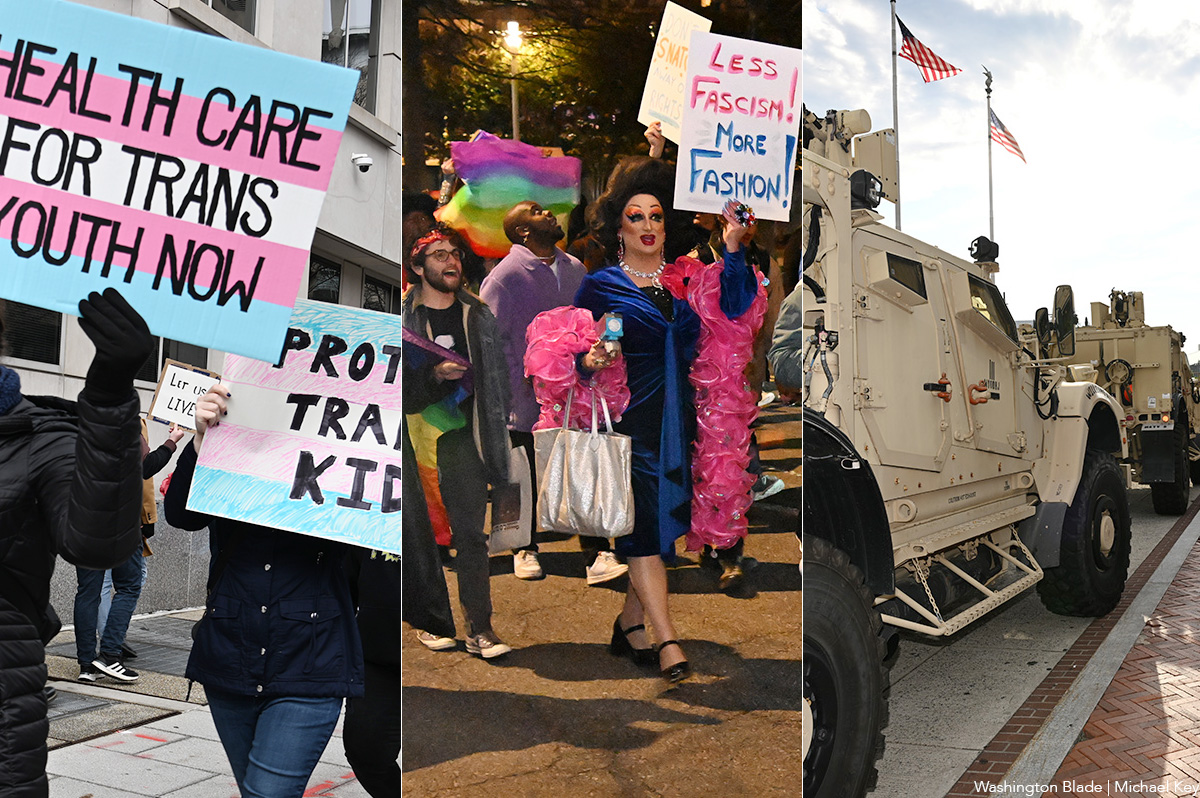
The year 2025 brought unprecedented challenges to D.C. as President Trump initiated a takeover of local police operations and implemented ICE raids in the city. Below are our picks for the top 10 LGBTQ news stories of the year.
10. Man gets 15 years for drug sale that led to deaths of two gay men
A D.C. man was sentenced by a federal judge on June 26, 2025, to 15 years in prison after he pleaded guilty three months earlier to conspiracy related charges that he distributed large amounts of fentanyl and cocaine in the D.C. area, including the sale of fentanyl that resulted in the December 2023 deaths of two D.C. gay men.
A statement released by the Office of the U.S. Attorney for D.C. said Jevaughn Mark, 33, was charged, among other things, with selling fentanyl rather than the requested ketamine, known as “Special K,” to one of the two gay victims who shared the drug with his gay friend. Police identified the men as Brandon Roman, 38, a prominent D.C. attorney and LGBTQ rights advocate, and Robbie Barletta, 28, a home renovation business owner and historic preservationist.
An official with the D.C.-based group HIPS, which provides services to drug users, called the deaths of the two men a poisoning rather than an overdose because they unknowingly consumed the highly toxic fentanyl rather than the ketamine they thought they had.
9. Drag queens, protesters denounce Trump’s Kennedy Center takeover
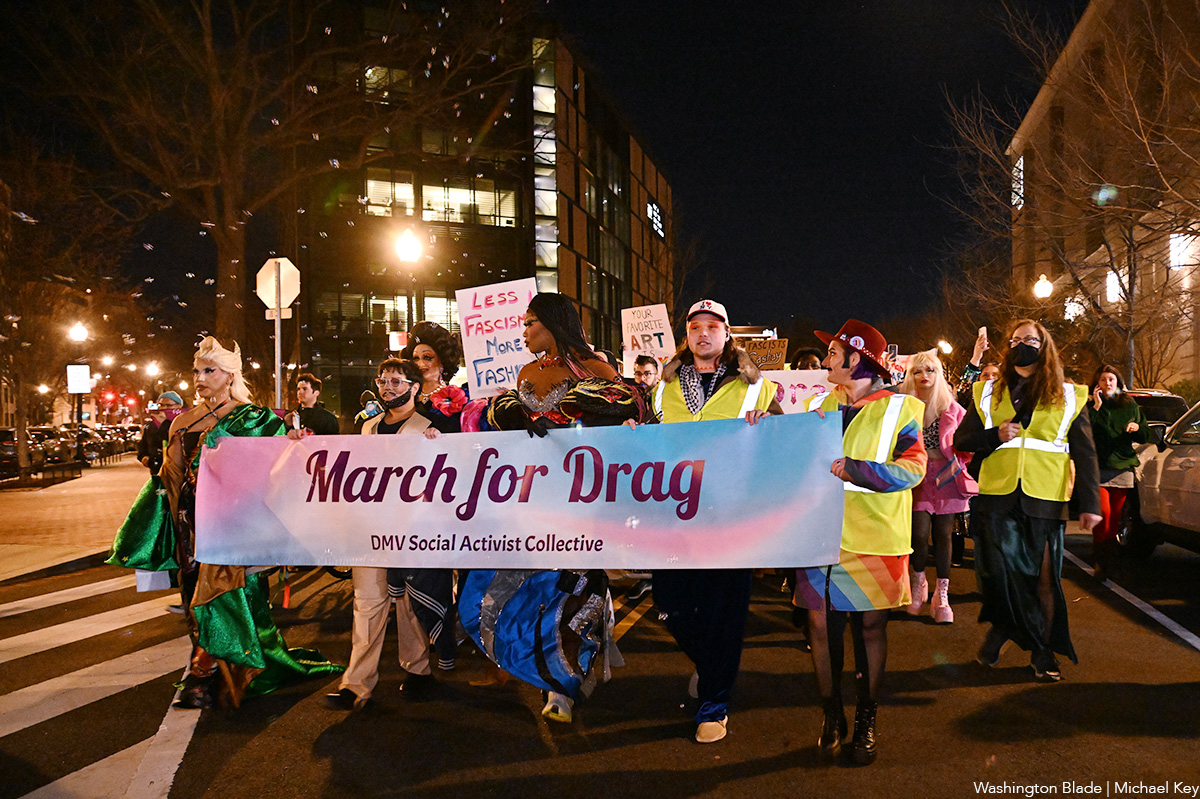
D.C. drag performer Tara Hoot was among other drag queens and about 100 supporters who marched in February from Washington Circle to the Kennedy Center to protest President Donald Trump’s Kennedy Center “takeover” by his appointment of Trump supporters to the performing arts facility’s board of directors.
Hoot and three other local drag performers followed up with their own Kennedy Center protest in June by attending the Kennedy Center’s opening night performance of “Les Misérables” while Trump himself was in attendance. Among the concerns raised by the protesters was the Kennedy Center’s decision in February to cancel a performance by the Gay Men’s Chorus of Washington scheduled for May to celebrate the upcoming WorldPride 2025 DC events. A Kennedy Center spokesperson said the performance was canceled because of “financial” and “scheduling” factors and not by the Trump initiated management changes.
8. D.C. LGBTQ Center celebrates opening of new, larger offices

The D.C. LGBTQ+ Community Center officially opened its new expanded offices on April 26 at 1828 Wiltberger St., N.W., located one block from the Shaw Metro station.
Spanning 6,671 square feet of intentionally designed space, Center Director Kimberley Bush said the new space would offer a wide range of resources for LGBTQ individuals in need – including mental health services, job readiness programs, cultural events and community support groups, all under one roof.
7. Deaths of five key local LGBTQ advocates in 2025
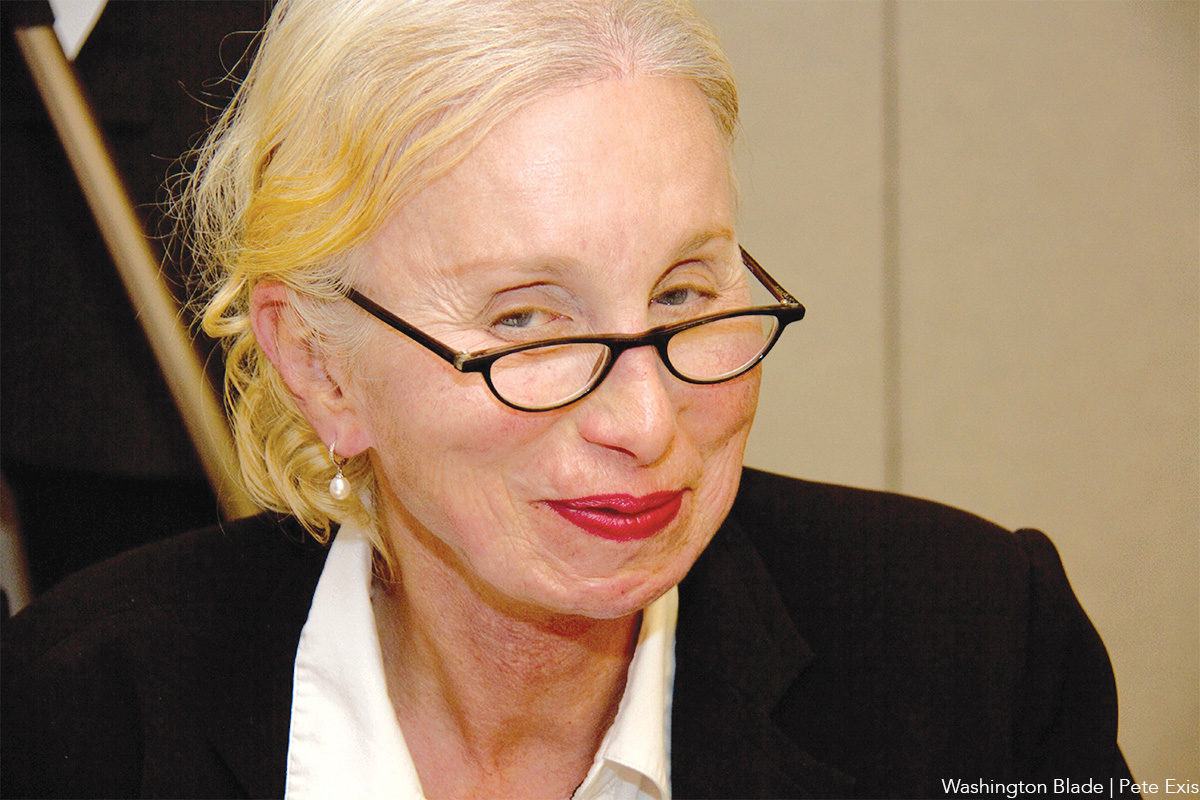
The LGBTQ community took note of the passing of at least five highly regarded local LGBTQ advocates in 2025. Among them were Jeri Hughes, 73, a longtime local transgender rights activist; Dale Sanders, 75, a highly acclaimed D.C. attorney for more than 40 years who played a leading role in providing legal services to people with HIV/AIDS; Patrick Shaw, 60, a highly regarded D.C. public schools teacher; Thomas Mangrum, 61, an acclaimed advocate for people with disabilities and LGBTQ rights activist involved in the city’s Capital Pride events; and Loraine Hutchins, a nationally known and acclaimed advocate for bisexual and LGBTQ rights, and co-author and editor of a groundbreaking book on bisexuality.
6. Pro-LGBTQ Spanberger elected Va. governor
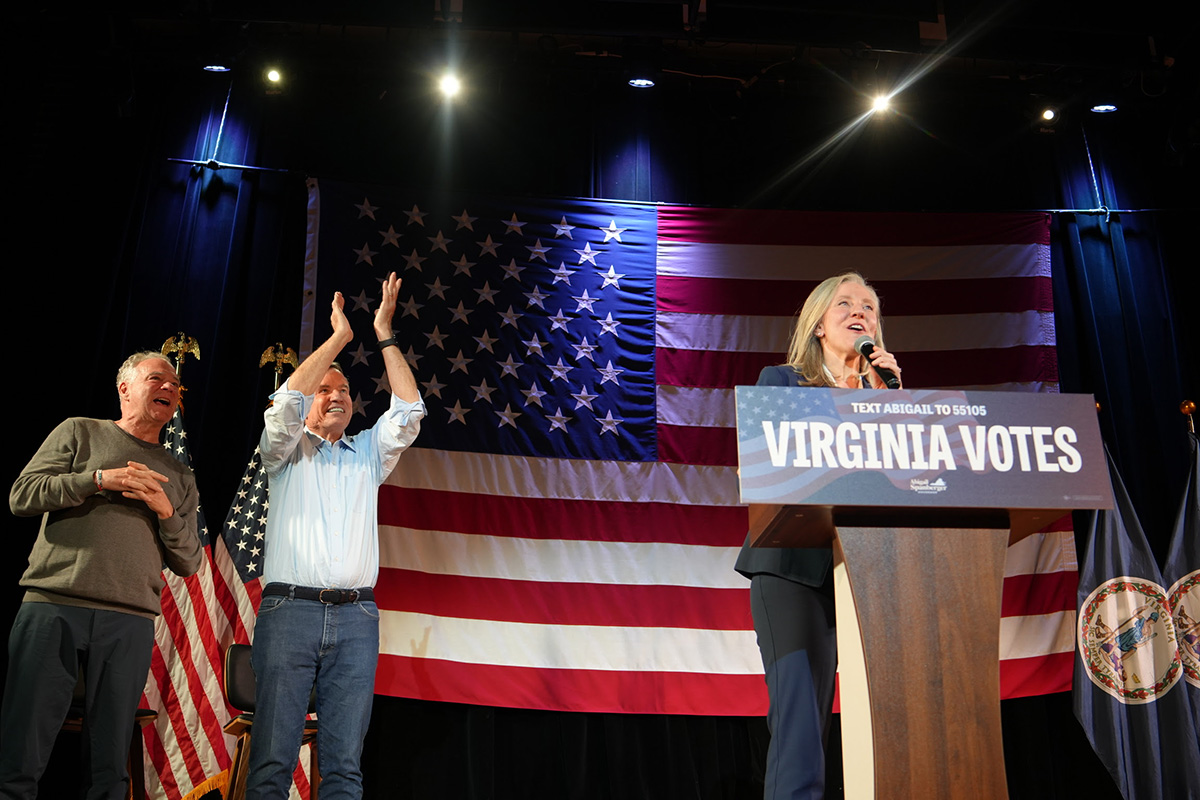
Former congresswoman and longtime LGBTQ rights supporter Abigail Spanberger (D) won her race for governor of Virginia on Nov. 6, defeating the state’s Republican lieutenant governor, Winsome Earle-Sears, who expressed strong opposition to LGBTQ equality. Spanberger, who will succeed incumbent GOP Gov. Glenn Youngkin in January, becomes Virginia’s first female governor.
Meanwhile, John Reid, a gay conservative radio talk show host in Richmond for many years, lost his race as the Republican candidate for lieutenant governor in Virginia, falling short of becoming the state’s first openly gay person to win a statewide office. Reid lost to Democrat Ghazala Hashmi, a member of the Virginia State Senate, who became the first Muslim woman to win election to a statewide office in any state.
5. Trans erasure hits D.C.
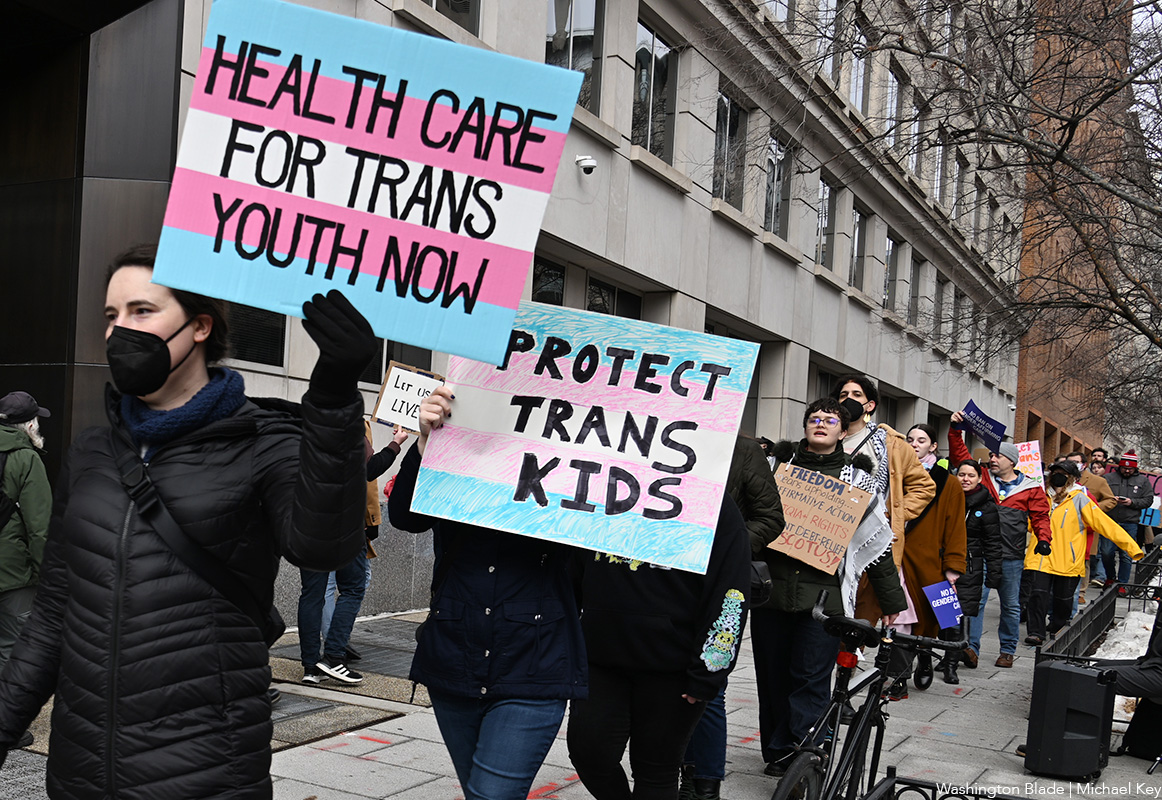
The National Park Service, which owns and maintains Dupont Circle as a federal park, in February removed all references to transgender people from its website devoted to Dupont Circle history. In a development believed to be linked to one of President Trump’s early executive orders banning federal support for trans related issues, the Park Service removed all mention of trans people from its website but left on the site multiple references to the “GLB community.”
In yet another act of what LGBTQ activists are calling “trans erasure,” D.C.’s Children’s National Hospital in July announced it would discontinue beginning Aug. 30 gender transition medical care it has provided for juvenile patients for at least the past 20 years. In a statement posted on its website, the highly acclaimed pediatric hospital said the change was made “in light of escalating legal and regulatory risks to Children’s National.” Most observers interpreted that to mean the risk of federal funding cuts linked to the Trump administration’s animus toward trans supportive programs or policies.
4. D.C. Mayor Bowser announces she will not run for re-election

D.C. Mayor Muriel Bowser, a longtime vocal supporter of the LGBTQ community, announced on Nov. 25 that she will not run for a fourth term. Since first taking office as mayor in January 2015, Bowser has been an outspoken supporter on a wide range of LGBTQ-related issues, including marriage equality and services for LGBTQ youth and seniors.
LGBTQ activists have pointed out that Bowser’s record of support on LGBTQ issues dates back to her tenure as the Ward 4 D.C. Council member from 2007 through January 2015, when she took office as mayor. They also credit her with expanding and significantly increasing funding for the Mayor’s Office of LGBTQ Affairs and appointing the largest number of openly LGBTQ officials to D.C. government jobs than any prior D.C. mayor.
“It has been the honor of my life to be your mayor,” Bowser said in a statement.
3. D.C. LGBTQ bars ‘hanging in there’ amid tough economy

The owners of several of D.C.’s at least 25 LGBTQ bars told the Blade in November they had been negatively impacted by a series of developments and issues impacting most other D.C. bars, restaurants, and nightlife venues. Among the lead issues impacting them, they said, were the deployment by President Trump of National Guard troops on city streets, the nearly two-month-long federal government shutdown that ended in late November, and skyrocketing prices of food and other supplies brought about by the Trump administration’s tariff program.
Other factors cited were a decline in tourist visits to D.C. due to alienation from the Trump administration and a large increase in the number of LGBTQ bars in recent years that some observers said has resulted in fewer people going to each of the LGBTQ bars, the latest one, Rush at 14th and U Street, N.W., having opened in December.
2. At least 1.2 million turn out for WorldPride D.C.

At least 1.2 million people turned out from throughout the U.S. and internationally for WorldPride D.C. 2025, which took place from mid-May through June. It included hundreds of events held across the city. Among them were an international human rights conference, a March on Washington for LGBTQ Equality, sporting events with LGBTQ athletes, concerts by LGBTQ choral groups and nationally acclaimed pop musicians.
The events culminated with a six-hour-long WorldPride Parade on June 7 that drew hundreds of thousands of participants and bystanders and included a 1,000-foot long rainbow flag that led the parade. The WorldPride street festival and concert took place that same day and the following day, on June 8, along Pennsylvania Ave, N.W. that included hundreds of booths.
The 1.2 million attendance and the a $310 million economic impact it had on the city were significantly less that what had been initially predicted by city officials, who, along with LGBTQ activists, said the lower attendance and economic impact was due in part to the anti-LGBTQ policies and alienation of many potential foreign visitors by the Trump administration.
1. Trump takes control of D.C. police, deploys National Guard

LGBTQ rights advocates joined community leaders across the city in condemning President Donald Trump’s decision in August to take control of the D.C Metropolitan Police Department and deploy 800 National Guard troops to address what he called a crime wave caused by “bloodthirsty criminals” and “roving mobs of wild youth.”
A coalition of local LGBTQ advocacy organizations joined other community leaders, including gay D.C. Council member Zachary Parker (D-Ward 5), in calling Trump’s action a “power grab” aimed at eliminating D.C.’s locally elected government that would adversely impact people of color, the LGBTQ and immigrant communities.
In a development that captured national attention, a gay man was arrested on Aug. 10 on a misdemeanor assault charge for tossing a hero sandwich into the chest of a uniformed U.S. Customs and Border Control agent on a street near several gay bars in what he called an act of protest and defiance of the Trump deployment of federal troops and agents in D.C. In what some observers called a gesture of support for gay sandwich thrower Sean Charles Dunn, a federal court jury handed down a verdict of not guilty for the assault charge.
District of Columbia
Reasons to be optimistic about 2026
Local thought leaders offer hope for the New Year
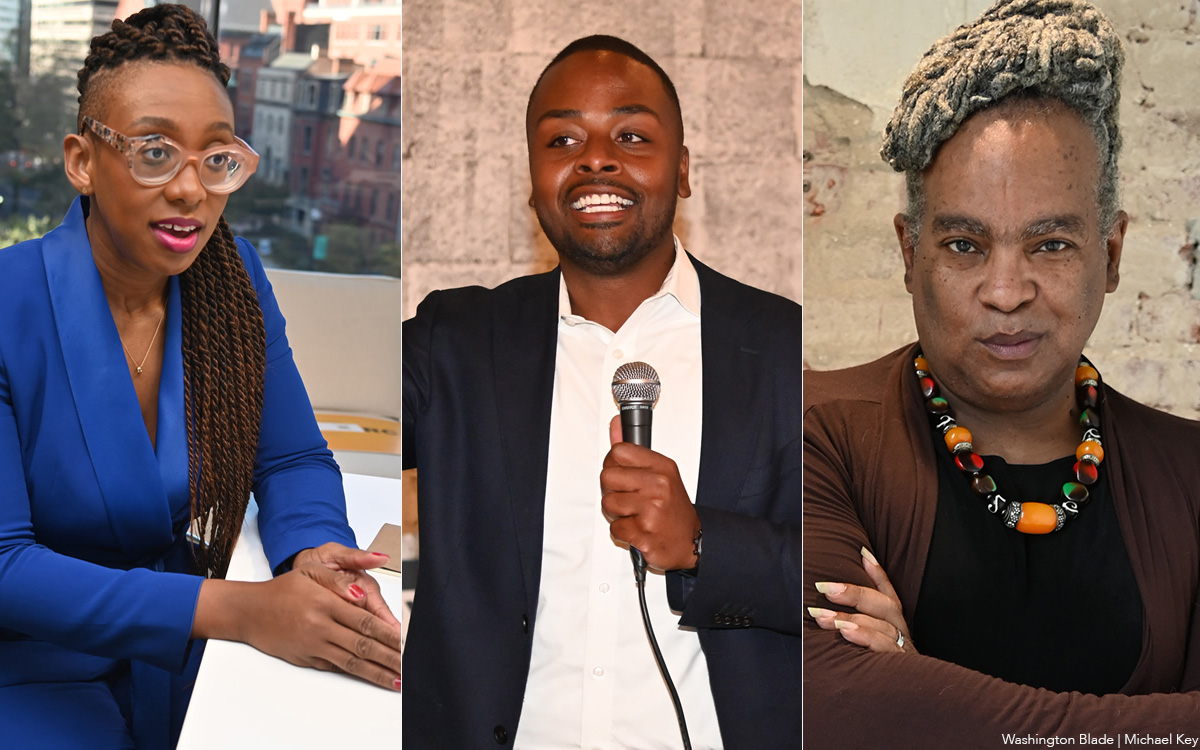
It was a year like no other. It began with Donald Trump’s inauguration in January 2025 and included a takeover of D.C. police, ICE raids, challenges for the local economy, and other events that have many queer Washingtonians ready for 2026.
As we prepare to welcome the New Year, the Blade asked a range of local thought leaders about what makes them optimistic for 2026. Here are their responses.
June Crenshaw
Deputy Director, Capital Pride Alliance
What gives me optimism for 2026 is the way our LGBTQIA2S+ community supports one another – across identities, neighborhoods, and movements – and because we continue to build our collective powers; we demand and create safer, more inclusive spaces.
Zachary Parker
Ward 5 DC. Council member
I’m optimistic about the upcoming elections and the District’s continued fight for local autonomy. One thing I know for sure is that Washingtonians are tough and persistent, and we’re ready to face any challenge as we keep fighting for D.C. statehood.
Sister Jeannine Gramick
Co-founder of LGBTQ supportive New Ways Ministry
As a nun who thinks politically about the Catholic Church, I’m extremely optimistic that Pope Leo XIV will continue to welcome LGBTQ people. At the conclave, most cardinals knew Pope Francis had (then) Cardinal Proost in mind!
Adam Ebbin
Virginia State Senator representing parts of Arlington, Alexandria, and Fairfax Counties
I am excited about 2026 bringing the return of the pro-equality governor to Virginia. I believe that Abigail Spanberger will be a champion for LGBT people and it will also be the year that we can finally pass the necessary legislation to send a constitutional amendment to the voters that would guarantee marriage equality in the Virginia Constitution.
Howard Garrett
President, Capital Stonewall Democrats
In 2026, our community can be optimistic because we’ve proven, again and again, that when we organize, we win: at the ballot box, in the courts, and in our neighborhoods. Even amid challenge, LGBTQ+ Washingtonians and our allies are building stronger coalitions, electing champions, and advancing real protections that make daily life safer and more affirming for everyone.
Paul Kuntzler
D.C. LGBTQ activist since the early 1960s, co-founder of Capital Stonewall Democrats
Last Nov. 4, 11 states held elections and Democrats won almost all of the elections. Next Nov. 3, 2026, Democrats will win control of both the House and Senate …An Economist poll reported that 15 percent to 20 percent of those who voted for Trump no longer support him. The results of the elections of Nov. 3, 2026, will be the beginning of the end of Trump and his racist and criminal regime.
Kelley Robinson
President, Human Rights Campaign
This past year has brought relentless attacks against the LGBTQ+ community, but it has also shown the resiliency of queer folks. While this administration has worked tirelessly to oppress us, we’ve met that oppression with courage. As we step into 2026, my hope is that we carry that energy forward and continue protecting one another, fighting back against injustice, and celebrating queer joy. If 2026 is anything like 2025, we know the challenges will be intense, but our community is more determined than ever to meet hate with resilience, and to turn struggle into strength.
Freddie Lutz
Owner, Freddie’s Beach Bar in Arlington and Rehoboth Beach
I am optimistic that the current president will fulfill his promise to boost the economy. We are all suffering – businesses in D.C. I just read it is 17 to 18 percent down. And I’m hoping the president will boost the economy. I always try to remain optimistic.
Nicholas F. Benton
Owner & Editor, Falls Church News-Press
My optimism stems from my belief in the human capacity and generosity of spirit. Those who are committed to those qualities will find a way.
Richard Rosendall
Former president, D.C. Gay & Lesbian Activists Alliance
MAGA efforts to demonize LGBTQ people are dangerous but will fail overall because understanding and acceptance have grown and endured. The blue wave in November 2026 will show this.
TJ Flavell
Organizer, Go Gay DC
Hope springs eternal. Nurturing your own wellness is vital to the New Year, including enjoying social and cultural activities through such groups as Go Gay DC – Metro DC’s LGBTQ Community. Also, 2026 ushers in a new tax deduction for charitable giving. Check the IRS website for details. You can make a positive impact in the New Year by supporting good charitable causes like the D.C. LGBTQ+ Community Center, a safe, inclusive, and affirming space where all members of our community can thrive.
Rayceen Pendarvis
Leader of Team Rayceen D.C. LGBTQ support organization
I have experienced many trials and tribulations in my lifetime, throughout which my spirit has enabled me to find peace despite the turbulence around me. Being optimistic allows me to be a beacon of light for those who may be lost in the darkness.
Zar
Team Rayceen organizer
My reason for optimism is this: death. Life is a cycle of time, change, and destruction. Everything is impermanent; the time any person rules is finite and eventually all empires end.
DJ Honey
Team Rayceen supporter
Despite the noise, I see 2026 as a year where queer people continue choosing community over isolation. Even when challenged, our culture keeps evolving. We are more visible, more creative and intentional about building spaces that protect each other and center joy without asking permission.
Nick Tsusaki
Owner, Spark Social House, D.C. LGBTQ café and bar
I’m optimistic for 2026 because it feels like the tide is turning and we’re coming together as a community.
District of Columbia
Rush reopens after renewing suspended liquor license
Principal owner says he’s working to resolve payroll issue for unpaid staff
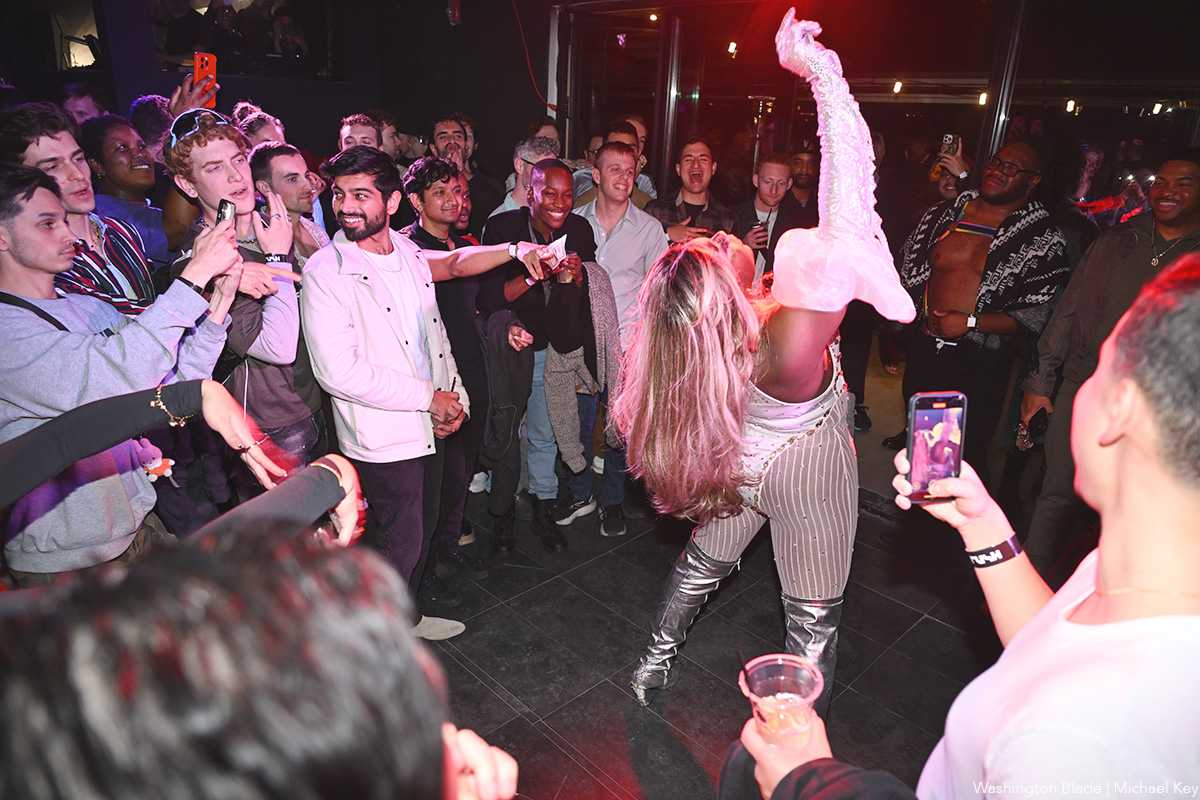
The D.C. LGBTQ bar and nightclub Rush reopened and was serving drinks to customers on Saturday night, Dec. 20, under a renewed liquor license three days after the city’s Alcoholic Beverage and Cannabis Board suspended the license on grounds that Rush failed to pay a required annual licensing fee.
In its Dec. 17 order suspending the Rush liquor license the ABC Board stated the “payment check was returned unpaid and alternative payment was not submitted.”
Jackson Mosley, Rush’s principal owner, says in a statement posted on the Rush website that the check did not “bounce,” as rumors circulating in the community have claimed. He said a decision was made to put a “hold” on the check so that Rush could change its initial decision to submit a payment for the license for three years and instead to pay a lower price for a one-year payment.
“Various fees and fines were added to the amount, making it necessary to replace the stop-payment check in person – a deadline that was Wednesday despite my attempts to delay it due to these circumstances,” Mosley states in his message.
He told the Washington Blade in an interview inside Rush on Saturday night, Dec. 20, that the Alcoholic Beverage and Cannabis Administration (ABCA) quickly processed Rush’s liquor license renewal following his visit to submit a new check.
He also reiterated in the interview some of the details he explained in his Rush website statement regarding a payroll problem that resulted in his employees not being paid for their first month’s work at Rush, which was scheduled to take place Dec. 15 through a direct deposit into the employees’ bank accounts.
Several employees set up a GoFundMe appeal in which they stated they “showed up, worked hard, and were left unpaid after contributing their time, labor, and professional skills to Rush, D.C.’s newest LGBTQ bar.”
In his website statement Mosley says employees were not paid because of a “tax related mismatch between federal and District records,” which, among other things, involves the IRS. He said the IRS was using his former company legal name Green Zebra LLC while D.C. officials are using his current company legal name Rainbow Zebra LLC.
“This discrepancy triggered a compliance hold within our payroll system,” he says in his statement. “The moment I became aware of the issue, I immediately engaged our payroll provider and began working to resolve it,” he wrote.
He added that while he is the founder and CEO of Rush’s parent and management company called Momentux, company investors play a role in making various decisions, and that the investors rather than he control a “syndicated treasury account” that funds and operates the payroll system.
He told the Blade that he and others involved with the company were working hard to resolve the payroll problem as soon as possible.
“Every employee – past or present – will receive the pay they are owed in accordance with D.C. and federal law,” he says in his statement. “That remains my priority.”
In a follow-up text message to the Blade on Sunday night, Dec. 21, Mosley said, “All performers, DJs, etc. have been fully paid.”
He said Rush had 21 employees but “2 were let go for gross misconduct, 2 were let go for misconduct, 1 for moral turpitude, 2 for performance concerns.” He added that all of the remaining 14 employees have returned to work at the time of the reopening on Dec. 20.
Rush held its grand opening on Dec. 5 on the second and third floors of a building at 2001 14th Street, N.W., with its entrance around the corner on U Street next to the existing LGBTQ dance club Bunker.
With at least a half dozen or more LGBTQ bars located within walking distance of Rush in the U Street entertainment corridor, Mosley told the Blade he believes some of the competing LGBTQ bars, which he says believe Rush will take away their customers, may be responsible along with former employees of “rumors” disparaging him and Rush.



